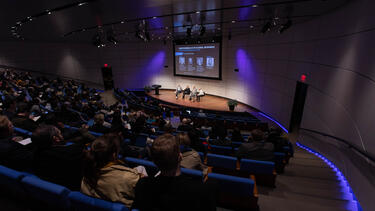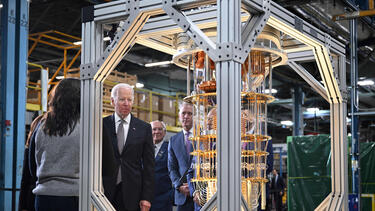All Insights Articles
What Bob Iger’s Critics Get Wrong about His Performance at Disney
Disney is embroiled in a proxy fight with activist investor Nelson Peltz ahead of its annual shareholder meeting next week. Prof. Jeffrey Sonnenfeld and co-author Steven Tian write that Peltz and other critics of CEO Bob Iger are relying on a series of myths that don’t hold up to scrutiny.

What Have the Bots Learned about Us?
The emergence of generative AI has opened new possibilities for the mass creation and dissemination of misinformation. Are the major social media platforms ready? We talked to Prof. Tauhid Zaman, who studies how bots manipulate opinion on social networks.

Better Sanctions Can Weaken Russia
Yale SOM’s Jeffrey Sonnenfeld, who has helped lead the movement to isolate Russia, and co-author Steven Tian write that the current sanctions regime is spottily enforced and ignores key commodities exports. They suggest three steps policymakers should take to give economic sanctions real bite.

Is AI a Savior or a Peril—or Both?
With applications of artificial intelligence spreading from the realm of data science to the apps at your fingertips, a day-long conference at the Yale School of Management considered how to unlock the technology’s positive potential while containing possibilities for misuse, misinformation, and labor-market mayhem.

Customer Data Can Reveal Revenue Fraud at Supplier Firms
Yale SOM’s Frank Zhang and his co-authors used publicly available information from suppliers and customers to zero in on the firms that were more likely to be cooking the books.

Can Industrial Policy Help Revive Struggling Regions?
A new paper co-authored by Yale SOM’s Cameron LaPoint looks at an effort in 1980s Japan to narrow economic inequalities between geographic regions, in order to understand the potential impact of the similar U.S. CHIPS and Science Act, enacted in 2022.

Going the Last Mile (with Evidence)
A study by Yale’s Mushfiq Mobarak and his colleagues found that nurses on motorbikes with vaccine-stocked coolers could help increase vaccination rates in rural Sierra Leone, showing that it is possible to get health interventions to the most remote and under-resourced areas cost-effectively, in ways that help ensure that the interventions are taken up and used.

What Does a Record Stock Market Mean?
We asked Yale SOM’s William Goetzmann, an expert on financial markets and the history of finance, what soaring stock prices say about the economy and the future of the markets.

A Divided America Emboldens Putin’s Aggression
Alexei Navalny’s death is another sign that Russia is testing the limits of the West—and the U.S. is failing that test, write Prof. Jeffrey Sonnenfeld and co-author Steven Tian.

What the U.S. Has to Gain from Supporting Ukraine
Prof. Jeffrey Sonnnenfeld and co-author Steven Tian write that spending on weapons and aid boosts the U.S. economy, strengthens the NATO alliance, and weakens the Russian war machine.
